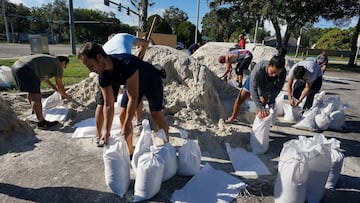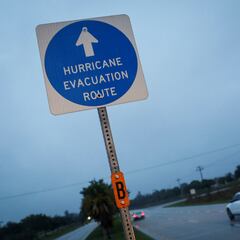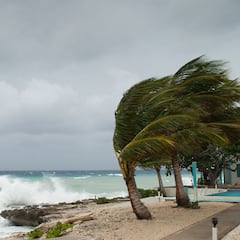During hurricane season in Florida the threat is very real. Are you prepared?
Don’t be caught off guard with a hurricane barreling down on you. Here is what emergency authorities recommend you do to be prepared for the monster storms.

Florida is no stranger to hurricanes during the six-month season with its long coastline and surrounding by warm waters. While the southeast is the most susceptible to getting slammed by one of these monster storms, all of the state’s coastline has seen a hurricane make landfall at least once since 1850 according to the Florida Climate Center.
Residents of the Sunshine State aren’t the only ones who have to worry about these destructive cyclones. They have struck New England and further north, as well as driving inland well into the interior of the nation.
While meterologists are getting better every year at predicting the monster storms Mother Nature can always throw a curveball. Those that live in a hurricane-prone area should keep in mind that during a normal year there is the possibility for at least four storms to reach Category 3 or higher and even mild hurricanes are a force to be reckoned with.
That’s why it is a good idea to get ready even before the threat of a hurricane is bearing down on you. The Federal Emergency Management Agency (FEMA) has a five step plan to prepare for hurricanes. It includes the following…
Have a communication plan:
Families should determine locations where they will go if separated, including out of town. You will also want to have contact information written down and easily accessible. And remember practice makes perfect.
Network:
Talk to your neighbors and have conversations about each other’s plans and who in the neighborhood will need to be checked in on.
Strengthen your home:
During the year make sure that tree branches close to your house are trimmed and clean your yard of any objects that could blow around which could damage the structure. In the event of a storm, board up doors and windows to protect from broken glass and debris entering the house.
Get your car read:
You should keep your car in good condition, filled with gas and have an emergency kit inside. Also know if you live in an evacuation zone and what type it is. You should be ready to evacuate if ordered to do so by the authorities. Your life is worth more than your property. If ordered to shelter in place, find cover for your vehicle.
🌊 Storm surge is a primary hazard associated with hurricanes. Do you #KnowYourZone?
— FL Division of Emergency Management (@FLSERT) May 24, 2023
🗺️ Make sure you know whether your home is in a flood-prone area or an evacuation zone to better understand local orders during a storm.
➡️ Find your zone: https://t.co/5C0Wq9aHaj pic.twitter.com/SwOfzDD4Nk
FEMA recommends gathering an emergency hurricane kit
People in coastal areas are advised to have an emergency hurricane kit on hand in case a storm does escalate into a major incident. Despite the best efforts of forcasters tropical storms can be extremely unpredictable and having the essentials kept together can save vital minutes.
The Federal Emergency Management Agency (FEMA) has issued guidance on what to keep in your hurricane emergency kit. They recommend gathering most of the items in an easy-to-carry bag that you can take if you need to evacuate, but you may need to keep some of the bulkier items (food and water) separate.
Related stories
Here’s FEMA’s suggestions for an emergency hurricane kit:
- Water, one gallon per person per day (keep a 3-day supply for evacuation, 2-week supply for home)
- Non-perishable, easy-to-prepare food (keep a 3-day supply for evacuation, 2-week supply for home)
- Flashlight
- Battery-powered or hand-crank radio
- Batteries
- First aid kit
- Medication and medical items (7-day supply)
- Multi-purpose tool, like a Swiss Army knife
- Sanitation and personal hygiene items
- Copies of personal documents (medication list and pertinent medical information, proof of address, deed/lease to home, passports, birth certificates, insurance policies)
- Cell phone, charger and battery pack
- Family and emergency contact information
- Cash, in case ATMs are out of use
- Extra fuel for generator and car, be extremely carefully storing
Depending on your family’s requirements, you should also consider bringing baby supplies, pet supplies and spare keys for your house and car. Less important but potentially still useful are towels, plastic sheeting, duct tape, scissors and work gloves.



Complete your personal details to comment